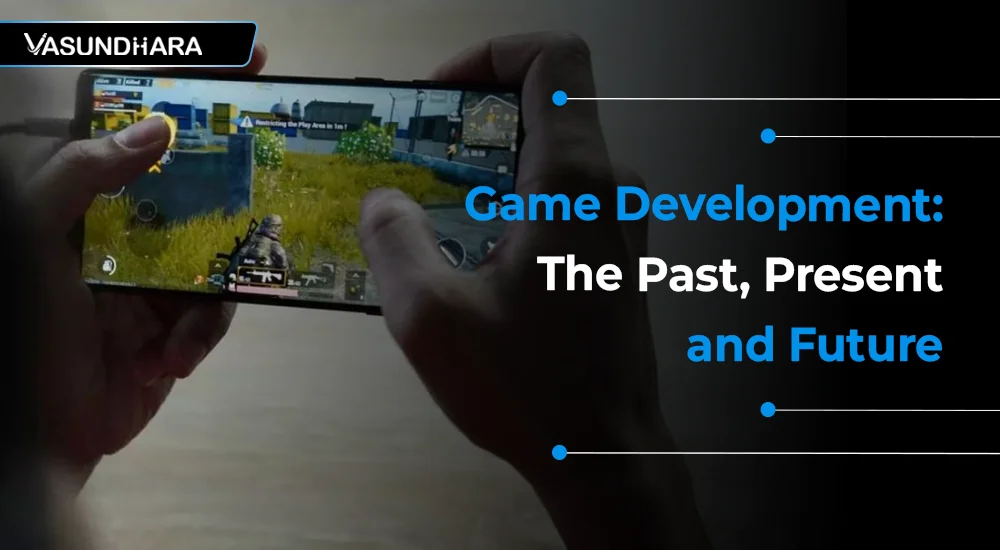Game Development: The Past, Present and Future


- Jul 26, 2022



Just like technology, game development has evolved over the years. There was a time when Gen X feared using technology or allowing their children to play with one.
Fast forwarding to today’s times, what’s the first thing people do to quiet a crying child? They give them technology! Be it a tablet, computer, or phone. And, that’s exactly where they try indulging them with games like educational, learning, or frictional.
In this blog, we’ll look into the game development history and its scope for the future.
Game development is the process to build a game, design, develop, and launch a game. Developers usually play multiple roles in game development, which include visuals, artificial intelligence, user interface, and game logic.
While you are developing, it is also essential to focus on the game mechanics, rewards, visual effects, player engagement, and design level.
For this article, I won’t go much in-depth on game development but on the history, present, and scope of game development ahead.
Entertainment has always been a core for humans. So, it’s no surprise for someone who thought game development would be a great idea.
Back when Windows 98 was popular, it launched games like Minesweeper, Solitaire, and Skyroads. Talking about video games, Super Mario was one of the favorites (Agree?).
While mobile technology came into the picture quite later, but had its own share to offer games like the snake on a Nokia in 1997.
(Hearing these still makes a 90s kid feel nostalgic!)
However, all of them were basic, uncluttered, and plain. They were characterized by low visual quality, little to no effects, block articles, polygon characters, snail-paced movements, and performance lag issues.
But it all doesn't last long and has advanced with time as well as technology! Let’s see what the current developers have in store.
These days it is extremely rare to move out without technology for even a day or two. It’s either a laptop, tablet, or of course your phone (always in your pocket).
The tech packed inside the latest phones has brought so much fun to our lives and evolved from being a mere communication device into a power-packed entertainment center.
Mobile game app development has become a breakthrough for people with routine chores. The most popular mobile games today include Candy Crush and PUBG.
But here’s a fact,
The annual research report by the ESA stated that 35% of regular gamers played games on their smartphones instead of a console.
With the evolution of handhelds and mobile devices, the way games are played has changed to a significant extent with versatile game categories.
Viz-a-viz it is seen that developers too are moving away from consoles towards PC and mobile game development.
Let’s take a look at some of the leading categories/genres of game development:

This list is in no way exhaustive or rather evolving time and again. Here’s shedding light on some of the new trends of game development below.
These games are played online and require social network integration, namely, Facebook. They allow gamers to stay connected and compete with each other based on levels or no.of games they win.
Everyday gamers also conduct occasional tournaments with their teams. Ludo, Candy Crush, Dota, and GTA are some of the most popular ones.
Here the gameplay progresses based on the location of the player which is tracked using the GPS technology.
Pokémon GO was one of the major hits for location based games that created a fun-competing environment among players.
Accelerometer helps the device sense movement or gravity at which the device is being held, opening new scope to mobile game technology.
These sensors function as game controllers that are placed to measure the tilt, angle and speed of player actions. Real Racing, Freefall, and PUBG are some examples of accelerometer games.
The gaming industry is winning with a worth of around $300 million. The advent of mobile games and lately the pandemic are contributions to this industry.
Check out some breakthrough stats:
In the US, people have around 8 games installed per device, Subway Surfers being the most popular one. By 2025, the mobile games industry will most probably reach $138 billion. 83% of video game sales happen in the digital world. |
It's not wrong if we say that the future of game development lies in mobiles and smartphones. With the fact that the mobile games industry is growing in leaps and bounds.
And to further solidify this, there are new gadgets hitting the markets every now and then followed by PSP and PS game consoles.
Where the question arises, are smartphones going to replace the consoles? Not that much, due to customers’ preferences and ease of playing.
Infact, a survey states that enthusiastic gamers never think of leaving their consoles.
On the other hand, a major development could be seen in gaming devices such as Wearables, Phablets, VR helmet sets, GameStream or cross platform access for the same game.
Future there might be an advancement in mobile phones such as 3D enabled Smartphones that enables 3D mobile gameplay.
Eventually It all ends in mastering the trends, fearlessness to experiment and beating the challenges.
Game development is an extremely complex industry. Where creating a game is only half the challenge. Making it popular and matching the current demands will help game developers to last longer.
However, it will be quite exciting to see how developers create modern games and help connect the audience on a larger platform.
From traditional video games to PC, consoles and now mobile apps, we can definitely expect a high level of development amongst them.
Copyright © 2026 Vasundhara Infotech. All Rights Reserved.